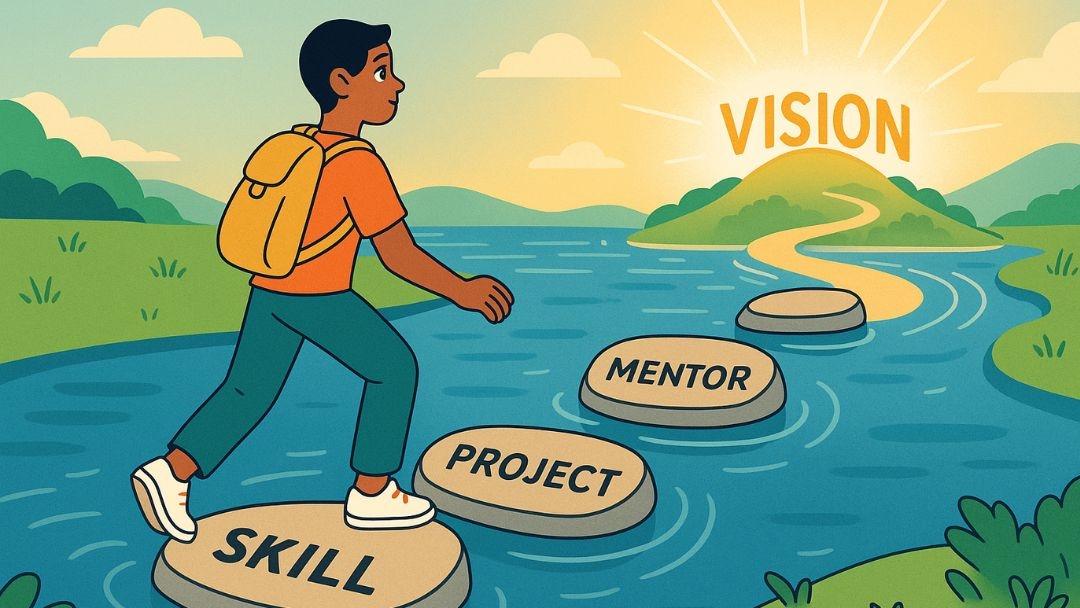Defining Your Future: Long-Term Career Goals for Success and Fulfillment
Here's how to plan the future you deserve! Discover practical strategies to set and achieve long-term career goals that align with your passion and purpose. Whether you're seeking fulfillment, financial security, or professional growth, this article offers everything you need to succeed. Don't leave your professional future to chance—start defining your path to success today!


Back
12 mins read
So, you’re trying to figure out where your career is headed, or maybe where you want it to go next. Whether you’re just starting out, switching paths, or ready to take things to the next level, it’s completely normal to feel unsure about what your long-term goals should look like.
I know that feeling. You set a goal, start chasing it, then suddenly wonder if it’s even worth it before another shiny idea takes over. Then comes the guilt for not having it all figured out. It’s a loop many of us fall into when thinking about the future.
The truth is, nothing’s wrong with you for feeling this way. So many professionals, at every stage, question their direction and how to align their aspirations with their personal values and ambitions. The good news is, it’s never too late to define your goals and never too early to start shaping your future.
In this guide, we will unpack what long-term career goals truly mean, share examples to inspire your own, and walk you through how to set them using the SMART framework so your growth feels both intentional and achievable.
By the end, you’ll have a clearer direction and maybe even that “aha” moment about what your next chapter could look like.
Related: Jobs Pay the Bills, Careers Build the Future — Which Is Right for You?
What Are Long-Term Career Goals?

Long-term career goals are significant professional objectives and milestones you aim to achieve within a few years or an entire professional life. These lifelong career objectives serve as a professional "North Star," providing a constant point of reference for both your professional and personal development. From the jobs you take to the organizations you work at, your long-term career goals are crucial in determining your entire career path.
Achieving these goals requires thorough planning and execution. This is probably why they are "long term," as you often need to achieve a series of smaller incremental goals that build toward the ultimate objective. By focusing on these smaller milestones, you can create a clear pathway to success and maintain motivation along the way.
When it comes to defining success, it looks different for everyone. For some, it’s about achieving major career milestones; for others, it’s about making a lasting impact or empowering the next generation. Your long-term career goals should reflect your own values and vision, because ultimately, they’re a mirror of what success means to you.
Having a "North Star" is important when starting your career, but it doesn't have to be set in stone. Change is the only constant in life. Your needs and professional environment will likely shift, which may alter your career goals, which is perfectly okay.
In response to these changes, you might need to make minor or major adjustments to your goals. Nevertheless, setting long-term career goals is crucial for a fulfilling and successful professional career. They provide direction and motivation as you navigate your professional journey.
Power of Direction: Importance of Long-Term Goals

A clear long-term career goal is fundamental to personal and professional development. Various research and career planning models consistently show that setting long-term goals helps individuals take action and achieve their objectives, leading to greater fulfillment and success.
Below, we'll explore key points highlighting the power of clear direction and the significance of long-term career goals. Let's get to them:
Goals Give You Clarity
It's easy to get caught up in the rat race of climbing the corporate ladder immediately after entering the workforce. While this often attracts a median salary progression, it doesn't always equal overall job satisfaction. It's like working harder at climbing a ladder of success over a long time only to realize the ladder was leaning against the wrong wall the entire time.
However, long-term career goals act like a compass, giving professionals a clear sense of direction. Your long-term career objectives make your purpose in the work environment clear and defined. So, instead of jumping at every opportunity and taking up any available role, you get to identify the options that matter to you and focus on them early to reach your destination faster.
A Clear Destination Drives Professional and Personal Development Journey
Long-term career goals help you define what you want out of life and craft an appropriate career strategy for achieving them. They guide your daily actions and strategic decisions.
Most long-term career objectives require specific skill sets, experiences, and certifications. Once you set your sights on a specific goal, it becomes easy to identify its requirements. From that moment on, you can start approaching your career with the end in mind. You'll start visualizing the coming years, months, days, and hours from that point onwards as milestones leading you to a strategic position.
This commitment to continuous learning and skill acquisition enhances your professional capabilities and contributes to your personal growth.
Chasing Something Worthwhile Makes You Feel Alive
You're bound to face countless challenges in your quest to achieve your long-term career goals. However, if you're truly invested in the vision, you'll be encouraged to remain resilient in the face of these challenges. More importantly, you'll be forced to adapt your strategies without losing sight of the ultimate long-term career objectives through it all.
According to a recent study, chasing achievement goals is positively related to life satisfaction and work well-being. You feel invested in something bigger than your immediate wants and possibly even greater than yourself. Compared to passively going through your professional life and taking on anything that comes by, this sustained chase of something worthwhile makes you feel alive.
7+ Examples of Long-Term Career Goals to Inspire You

No two career paths look the same, and your long-term goals should reflect that. For some, success means reaching the top of an organization; for others, it’s about flexibility, purpose, or freedom. While the details differ, the purpose is the same — to create a vision that motivates you and guides your short-term steps.
The following examples highlight some of the most common long-term career goals and what they can look like in practice.
1. Attaining a Leadership Position
Working toward a senior leadership or executive role within your organization or moving to another company if necessary.
Attaining a senior executive or leadership position is one of the most common long-term career goals among professionals, especially those comfortable with their current roles. Once you're content with your current job, climbing the hierarchy from an entry-level position to a senior-level management or leadership position makes sense.
While many executives are drawn to drawn to the allure of a specific job title, such as Chief Executive Officer (CEO), Chief Marketing Officer (CMO), or Chief Financial Officer (CFO), others simply want to enjoy the perks associated with such positions.
Regardless of your unique motivation, achieving these career goals takes time and resources. Sometimes, they require a unique combination of leadership skills, experiences, and professional certifications. Therefore, you must set short-term goals that get you closer to your long-term goal. These goals could be gaining relevant experiences from specific entry and mid-level positions, networking with cross-functional colleagues, demonstrating your management skills by leading certain projects at work, or getting a new degree.
All these short-term goals give you valuable additional knowledge about your industry and boost your chances of employment.
2. Earning a Sizable Income
Building a career that leads to long-term financial growth and stability.
Achieving a specific salary or compensation level sometimes comes naturally with career progression. However, it may also be the main goal for some professionals. You may want to build enough financial capacity to afford a certain lifestyle or make major purchases such as a new home, new car, or investment, and it is possible to fund those dreams with your job.
Performing excellently in your current role and strategically positioning yourself for promotions can help you achieve this goal. Once you've determined your exact financial needs, you can set an appropriate salary expectation and determine the roles with matching monetary benefits.
3. Starting a Personal Business
Launching your own business or becoming self-employed after gaining industry experience.
Many professionals view their current job as a means to an end. They dream of becoming self-employed as freelancers, contractors, or consultants or running a successful business in the near future. Consequently, they often take up certain jobs to either gather enough experience or raise capital to fund their own business.
According to this recent study, the motivational factor behind starting a business is usually the desire to pursue a business idea and become one's own boss. Individuals who do not enjoy being confined to routine schedules and fixed positions often gravitate towards this goal, especially when they're not convinced that their long-term personal goals do not align with their current company or career paths.
If you feel the same way, you should be prepared for the risks associated with entrepreneurship, such as competition, bankruptcy, political and economic instabilities, and human resource challenges. Nonetheless, it is a very achievable goal, especially with the right mindset and careful planning.

4. Achieving Work-Life Balance
Developing a career that allows for both professional success and personal well-being.
Changing work patterns have made increasing work-life balance one of the emerging career goals in recent times. More professionals are recognizing the negative impact of burnout and overwork. As such, they're now prioritizing a healthy balance between work and their personal life activities.
Research has shown that balancing professional activities and personal life is essential for emotional and physical well-being and overall job satisfaction. Professionals who get it right tend to be more engaged and productive in their roles, leading to greater career fulfillment. That seems to be the main long-term career goal for many people: the freedom to allocate time for family, work, hobbies, and self-care.
5. Becoming a Thought Leader
Becoming a recognized voice of authority and innovation in your field.
A thought leader is an industry voice of authority. They are well-respected and widely recognized as sources of unique insights and perspectives, and others turn to them for guidance and opinions. Think of the opinions of someone like Elon Musk in the space exploration or EV industries.
The goal of attaining a thought leadership position can be somewhat vague, as there are no fixed metrics for measuring success like there are for other long-term career goals, such as earning a specific income. As such, it often takes more than just climbing a corporate ladder or executing your daily tasks. Most times, you often have to do ground-breaking things with lasting impacts, not just on your organization but your industry at large.
For instance, you need to develop a clear understanding of pressing industry challenges and provide novel solutions to them. For example, Elon Musk and his company, SpaceX, dramatically reduced space travel costs by developing reusable rockets like Falcon 9 and Starship. You can also work towards thought leadership by publishing insightful research, books, or a recognized project with far-reaching benefits.
The catch here is committing to advancing your industry in any way possible.
6. Working at a Desired Organization or Industry
Securing a long-term position in a company or industry that aligns with your passions and values.
Some individuals also set their sights on a particular company or sector for different sentimental reasons. This could be due to an alignment of personal values, interests, career ambitions, or mere admiration for the company or industry.
As with other long-term career goals, you'll have to work backward from the requirements of your dream job. You must ensure your experiences, values, and skills match the role's requirements. You may even have to make a career change in some extreme situations.
However, it is often worth it if you truly want it. Fulfilling this age-long ambition often results in better engagements, job satisfaction, productivity, and work-life balance.
7. Retiring Early
Planning and saving strategically to achieve early retirement and long-term financial freedom.
Retirement is almost an unavoidable aspect of every professional career. While many professionals treat this casually by just running down the clock, more people prioritize putting themselves in a position where they don't have to work actively till old age.
This ambition often stems from the desire to escape traditional work life and pursue passions, travel, and quality time with friends and family. It is an attempt to live life on one's terms.
Early retirement requires careful financial planning and disciplined savings. You must ensure you can fund the lifestyle you want after you stop working and earning. But financial readiness isn't the only thing you need to consider if you want to retire early.
You must also consider how you'll fill your time to ensure that you find true joy and fulfillment in the latter stages of your life. You can work towards financial success and a fulfilling lifestyle without work responsibilities.
8. Bonus: Other Notable Long-Term Professional Goals
Here are other long-term goals worth mentioning:
- Build a personal brand: You may decide to grow an authentic online presence that highlights your expertise and values.
- Expand your professional network: Form strategic relationships with peers, mentors, and thought leaders in your field.
- Transition into a new industry: Use reskilling and transferable experience to enter a field that excites you.
- Become a mentor or coach: Share your knowledge and help others advance in their careers.
- Gain international or cross-cultural experience: Work abroad or collaborate with global teams to widen your perspective.
- Earn a professional certification: Complete a credential or advanced training to deepen your credibility.
- Secure remote or flexible work: Design a career path that prioritizes autonomy and work-life balance.
- Contribute to social impact: Align your work with causes like sustainability, equality, or education.
- Write or publish a book: Share your knowledge and establish authority by writing a book or publishing research.
Long vs. Short Term Career Goals: Why You Need Both

Think of your short-term goals as the stepping stones and your long-term goals as the destination. Both are equally important. Short-term goals keep you moving and motivated day to day, while long-term goals give your career direction and meaning over the years.
When short-term and long-term goals work together, you create a career plan that’s both motivating and manageable. Each small win becomes proof that you’re moving in the right direction, and those consistent steps eventually lead you exactly where you want to be.
For example, many younger professionals today are redefining what success looks like. Instead of chasing promotions at all costs, they’re prioritizing careers that support mental health, flexibility, and time freedom. If your long-term goal is to achieve work-life balance, your short-term goals might look something like this:
- Set boundaries around overtime and after-hours communication.
- Negotiate remote or hybrid work arrangements with your employer.
- Schedule time each week for exercise, rest, or creative hobbies.
- Delegate nonessential tasks or learn to say no without guilt.
- Build a financial safety net that reduces pressure and creates more freedom.
For earlier generations, the “40 years, 40 hours a week” model was the standard for success, but today’s workforce is proving that balance can be just as ambitious a goal as advancement. Both paths are valid; what matters is choosing the one that reflects your values and long-term vision.
Related: Breaking the Hustle Culture Habit — Finding Balance in a World That Glorifies Grind
How to Set Long-Term Goals: 5-Step SMART Framework

Long-term goals only come to life when you have a clear system for making progress. The SMART framework gives you that structure — helping you turn big ambitions into focused, actionable steps that keep you moving forward. This is where your short-term and long-term goals finally work together to move you toward the career and life you want.
It’s a simple but powerful method that transforms vague ideas into measurable progress. To see how it works, let’s look at a real example.
In this case, the long-term career goal is to become a Chief Marketing Officer (CMO). Here’s how you could break that goal down into short-term steps using the SMART method — Specific, Measurable, Achievable, Relevant, and Time-bound.
1. Define a SPECIFIC Long-Term Career Goal
The first step is to clarify what success looks like for you.
Long-term goal: “Become a Chief Marketing Officer (CMO) at a mid-sized or large company where I can lead brand strategy, digital transformation, and team growth. “Yes, that specific.
Short-term goals to support it:
- Complete a leadership or digital marketing certification.
- Lead one cross-functional campaign from start to finish.
- Take ownership of a high-visibility project within your department.
These short-term goals build the skills and visibility you’ll need for executive leadership.
2. Set MEASURABLE Criteria for Progress on Your Career Goals
Progress feels real when you can quantify it. Decide how you’ll know you’re moving forward.
Short-term measurable goals:
- Earn an MBA or advanced certification within 24 months.
- Grow your department’s revenue or audience reach by at least 25% year over year.
- Manage a team of five or more and track their performance improvements.
Each of these milestones can be measured and celebrated along the way, making the long-term vision feel less abstract.
3. Ensure Your Long-Term Career Goals are ATTAINABLE
Big goals should stretch you—but not break you. Make sure each step is realistic given your current role, resources, and schedule.
Short-term attainable goals:
- Find a mentor who is already a marketing executive and meet monthly.
- Volunteer to present results in leadership meetings to build confidence and visibility.
- Enroll in a finance-for-marketers workshop to strengthen business literacy.
These smaller wins keep momentum steady without overwhelming your workload.
4. Make Sure Your Career Goals are RELEVANT to You
Every step should connect to your values and larger purpose. If your long-term goal is CMO, it should align with what actually motivates you about leadership and marketing.
Example reflection: “I value creativity, mentorship, and strategic thinking—becoming a CMO lets me amplify those strengths and make an industry-wide impact.”
Short-term alignment goals:
- Lead initiatives that combine creativity and analytics, such as a brand storytelling campaign with measurable KPIs.
- Mentor one junior marketer each quarter to build coaching experience.
These goals ensure that every step you take aligns with your values, keeping your motivation strong and your progress meaningful.
5. Establish a TIMELINE for Reaching Your Career Goals
Set realistic timelines for both short-term and long-term outcomes. This turns ambition into an actual schedule.
Your timeline roadmap may look like this:
- Year 1–2: Move into a marketing manager or team lead role.
- Year 3–5: Earn your MBA and lead a major brand initiative across multiple regions.
- Year 5–7: Transition into a director or VP role, focusing on strategic planning and company-wide growth initiatives.
- Year 7–10: Step into the CMO role at an organization aligned with your leadership style and vision.
Each milestone represents a short-term goal in itself—manageable, time-bound steps that collectively move you toward the big picture.
By weaving your short-term goals into the SMART process, you transform a distant dream like “becoming a CMO” into a living strategy—a series of specific, measurable actions that grow with you over time.
Forge Your Path: Set Key Milestones for Career Growth

You can't go wrong with working towards a long-term career goal. Whether you're pursuing a career change or climbing the ladder of your current career path, having a clear direction gives you the focus and purpose needed to thrive. It’s not just about achieving milestones; it’s about gaining clarity of purpose, having a plan, mastering time management skills, and building the career stability that sustains your ambitions over time.
The best part is the power of choice. From taking on senior executive positions, allowing you to gain leadership experience and attaining an industry-wide thought leadership role, to earning lump sums of money and retiring early with your stash, you get to define your journey.
Whatever you decide, ensure your goals are Specific, Measurable, Achievable, Relevant to your values, and Time-bound. This foundation of SMART goal-setting allows you to tackle responsibilities one day at a time and stay grounded while steadily moving toward your long-term job goals. With patience and perseverance, those big dreams will become your reality.
Have fun smashing it!


Return to Blog




